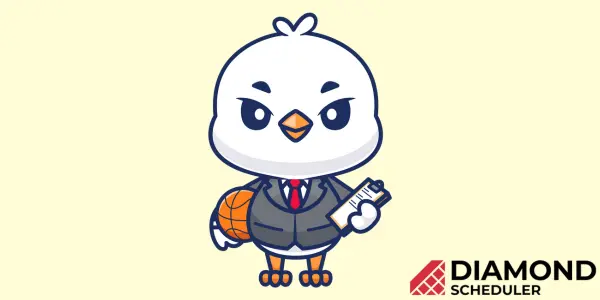
Guide to Entry-Level Sports Management Jobs for 2024
So you want to enter the world of sports management but you don't quite know where to start. If that sounds like you then you've come to the right place.
Entry level sports management jobs include many different positions, from sales associate to marketing manager.
In many of these roles, you'll help promote a team using various forms of media, seek endorsements for athletes or teams, evaluate player contracts, and more.
If you want to learn more about entry level sports management, keep reading.
What are the types of sports management jobs?

Sports management does not only encompass a management position but several other roles, as well.
You can also expect to find business-related positions such as managing an equipment store and providing athletes with personalized advice or giving marketing presentations to help sell products to professional sports teams.
Your primary job as an entry level employee is to learn more about your job and how to fulfill each responsibility.
You won't necessarily need relevant professional experience, but this is based on the company.
Below, we've outlined a few typical entry-level positions to give you an idea of what you can expect going into this industry.
1. Account specialist (basic accounting assignments)
One of the most often-advertised sports management positions is an Account Specialist for basic accounting assignments.
In this role, you're expected to offer good customer service to your assigned accounts, maintain the company's accounting information, create tournament brackets, schedule various events, and develop customer relationships.
If you enjoy working in fast-paced environments, are well organized, love helping people, and can handle several priorities simultaneously, being an Account Specialist may be for you.
Here's what Account Specialists do:
Organize information via database management, filing systems, and calendars
Manage accounts using various tools provided by the company
Work with accounts to update and inform customers of upcoming events
Make customer service calls to communicate feedback to appropriate teams
What you must bring to the table:
Be at least 18 years old
Strong problem-solving and customer service skills
Proven computer literacy
Ability to learn new systems
Excellent interpersonal, written, and verbal skills
Diploma or degree (4-year degree is often preferred)
2. Sports coach/regional manager
If you decide to enter a regional manager role, you'll likely be in charge of motivating and managing a team of coaches or mentors in after-school learning programs.
You must hold coaching teams accountable for their scheduled shifts and monitor the quality of their teaching.
A company may also require you to manage daily communication and logistics with schools, ensuring their schedules are updated and accurate.
Of course, there are people skills involved, so you'll need to be able to build relationships with your coaching teams.
The responsibilities of a Regional Manager generally include:
Administrative work, such as program schedule auditing and humanity adjustments
Staff management (manage coaches and be their primary point of contact)
Team building by fostering a positive culture within your assigned teams
Managing programs and quickly resolving issues
Implementing the required procedures to improve programs assigned to you
The requirements:
At least 1 year of experience in team leading or management
Familiarity with after-school programs and coaching
Strong communication skills and a sturdy presence
Ability to work on your feet and perform light physical activity for extended periods
Read More: 12 team schedule generator. Creating a schedule for a 12-team league is challenging. We show you how!
3. Junior data analyst
An entry level position in sports management won't always be about being on the field working with youth or adult sports teams.
Some positions require a more administrative role, like Junior Data Analysts.
As a Junior Data Analyst, you'll need to be highly technical and hardworking with a keen eye for detail.
Be prepared to muster all of your motivation for this role, as you'll likely have a lot on your plate as soon as you're hired.
Here are some of the duties a Junior Data Analyst is expected to fulfill:
Online data collection, storage, and organization within the company's internal databases
Analyzing a range of data from different clients
Working independently with minimal direction or supervision from your superiors
Meeting multiple deadlines within limited time frames
What you'll need:
Skill using several data analytics softwares like MS Office, API, Excel, and SQL
Familiarity with databases and data warehouses
Experience with creating and maintaining Google Analytics accounts
Optional experience in programs like Python
What degree do I need for sports management?

When browsing for management jobs in the sports and recreation industry, you'll often find that companies require you to have a management degree.
While this isn't the case for every sports management position, having a degree or diploma in sports management can greatly improve your chances of landing an interview.
Here are some degrees that you can pursue if you want to become a sports team manager:
1. Bachelor of Science (BSc) in Sports Management
The name says it all!
An undergraduate sports management degree will prepare you for most entry-level positions in the industry.
Some students start with a 4-year undergraduate program at university, while others will begin by earning a 2-year associate degree at a community college before transferring to a 4-year program.
Whatever the case, when working toward a BSc in Sports Management, you'll cover a range of business management topics.
You may take courses in event planning, brand management, facility management, and even the legal aspects of athletics and sports.
2. Bachelor of Business Administration (BBA) in Sports Management
If being in a leadership position interests you more, then you may want to work toward a Bachelor of Business Degree.
With this degree, you'll be taking courses regarding the business side of sports management including finance, management, marketing, and accounting.
BBA degrees usually take between 3 - 4 years to complete.
With this degree, your potential career options include sports management, sports general manager, parks and recreation director, sports advertising sales manager, or you can take the athletic director career path.
3. Ph.D. in Sport Management
Interested in academia? Consider getting a Doctorate in sports management.
Not only will you have the privilege of earning the 'Doctor' title, but those with these degrees often go on to have careers as researchers, professors, economists, and urban developers in the context of recreation and sports.
As a candidate for your sporting management doctorate, you will develop an original doctoral dissertation.
For the duration of your program, you'll develop research proposals, conduct research, and take supplemental coursework.
How much do entry-level sports management jobs pay?

So, how much can you make in sports management?
The average salary for a sports management professional is around $42,942 in the United States.
That equates to about $21.00 an hour—well above minimum wage and enough to live a comfortable life.
You can expect to earn roughly $22,500 per year on the low end of the spectrum.
Positions that pay around this amount usually require minimal qualifications and experience but can be a great way to enter the workforce and build up your reputation.
At the other end of the spectrum, once you've put in the work and built up a sturdy resume, you could earn around $61,000 a year.
It will take some time for you to reach this level, but it's certainly not impossible.
What are some sports management focuses?
Sports management is a multidisciplinary career with many branches.
Many students pursue a specialization in sports management to further their expertise in a certain branch.
If you're interested in a certain aspect of the industry, you'll likely find a program focusing on that field.
Here are examples of focuses you could pursue while studying sport management:
1. Sports Media
Sports media involves reporting on and broadcasting news regarding teams, coaches, and events, and other sports-related updates.
Jobs in this industry include photography, print journalism, program production, and broadcast reporting.
Some of the biggest employers in sporting media include ESPN, MLB Network, and NBC Sports Regional Networks.
While it may take several years, you can work your way into a position with one of these companies.
This role is well-suited to people interested in journalism and sports but don't want to choose between them.
Working in sports media gives you many opportunities for growth within your career.
As you find what interests you within the niche, you can switch focuses.
2. Sports Law
Several laws impact the world of recreational, amateur, and professional sports, and it is the responsibility of sports lawyers to help coaches and athletes navigate these laws.
What's more, sports lawyers will help athletes avoid costly litigation when possible.
a. Trademark Law
Sporting teams are identified by their logos, names, and sometimes even their slogans.
Athletes and teams need to trademark these assets to hold control and rights over them.
Sports lawyers can assist with this by filing these trademarks and enforcing their terms in the case of violations.
b. Contract Law
Contract law involves the contracts between coaches, athletes, and their teams.
You'll most often see these contracts in professional leagues, and if you follow sports, you know that they often involve millions of dollars.
As a sports lawyer, you will be responsible for drafting these contracts and aiding in their negotiation.
c. Personal Injury Law
This field exists inside and outside of sports but is essential in professional sports.
Athletes are prone to injury, whether they're on the field or not.
If an athlete files a claim after being injured, personal injury lawyers will offer them help with the claims process.
What's more, venues that host sports events must ensure their space is safe to avoid liability for personal injury.
Check out this video to learn more about Sports Law:
[embed youtube] https://www.youtube.com/embed/aP_dkMT4pWU [/embed youtube]
Read our related article:Youth Sports Insurance Companies. Injuries are common in sports. Here's how to protect your youth athlete.
3. Event Management
As the name suggests, event management involves coordinating, planning, and organizing events for various sporting teams and organizations.
To organize and execute any sporting event, whether a minor league baseball game or an entire marathon, you'll need to have excellent decision-making skills and unwavering attention to detail.
Amongst your other key responsibilities, you will be required to negotiate with vendors, manage budgets, and organize daily logistics for athletes.
Frequently asked questions
Below are some of the most frequently asked questions entry-level employees have regarding this career path.
Is sports management in demand?
About 70% of Americans consider themselves sports fans, and the sporting industry enjoys a very positive growth outlook.
Thus, growth rates for jobs, including scouts, agents, coaches, and managers, are consistently on the rise.
Is it hard to get a job in sports management?
Sadly, securing a job in sports management can be challenging, especially for those who lack the proper industry connections or education.
A degree in this field gives you a much higher chance of standing out amongst your competition, increasing your chances of landing a position.
If you can get into the industry, you could have a very lucrative career.
What are the highest-paid jobs in sports management?
Marketing consultants have one of the highest-paying jobs in this niche.
According to the U.S. Bureau of Labor Statistics, they earn an average annual salary of $133,380.
Sales managers also earn a decent average salary of $127,490, while sports agents can look at a median salary of $110,000 per annum.
What does a person with a sports management degree do?
Those with sports management degrees generally have several career options to choose from.
Some pay you to work with athletes directly, providing them with coaching or serving as facilities or sports directors.
Others take the corporate route, working as lawyers, marketers, data analysts, or sports news reporters.
Regardless of your route, if you have a degree you can expect to perform skilled labor throughout your career, even in an entry-level position.
Conclusion
Whether you take the corporate route or prefer working with players out on the field, sporting management can be an illustrious and lucrative career regardless of your job title.
With a little elbow grease and the right connections, you'll be able to enter the workforce in no time.
Thalia Oosthuizen has been writing in a professional capacity for over a decade. Her love for sports has led her down the path of sports writing, where her passion and skills combine. Thalia is a runner, cyclist, and swimmer, and enjoys playing tennis and hockey. Her favorite sports teams include Chelsea F.C. and the Georgian Lions Rugby Club.



